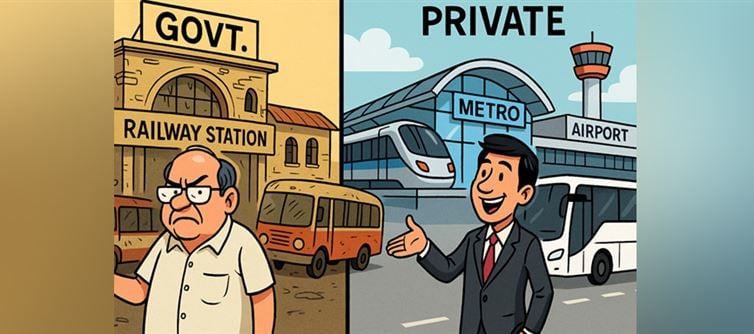
THE GREAT indian CONTRAST — WHEREVER THE government BUILDS, DECAY FOLLOWS; WHEREVER PRIVATE PARTNERSHIP ENTERS, PERFORMANCE ARRIVES
Walk through any government-run facility in india — a railway station, a bus depot, a public park, a municipal office — and you’ll find peeling walls, broken taps, faded signboards, lost files, and staff who behave like they’re doing you a favour by existing.
Now take a metro ride. Or step into an airport. Or drive on a modern expressway. Suddenly, india feels like a different country — clean, efficient, on time, functional, world-class.
It’s not a mystery. It’s a management problem, a mindset problem, a maintenance problem, and above all, a governance problem.
And the deeper you dig, the more brutal the truth becomes.
“10 Reasons Government-Controlled Infrastructure Looks Like Relics — While PPP Projects Look Like the Future”
1. government Builds. Then Forgets.
A government project is treated like a one-time achievement.
Inaugurate it. Cut ribbon. Take photos.
Maintenance? Accountability? Timelines?
All vanish faster than a file in a sarkari cupboard.
2. Babus Act Like Feudal Lords, Not Public Servants
The bureaucracy’s culture is still stuck in the colonial mindset.
They’re the sahib, you’re the subject.
Efficiency is optional. Responsiveness rare.
Innovation? Forget it.
Systems work despite them, not because of them.
3. Public Assets Age Like Milk, Not Wine
Railway stations crack.
Bus depots rot.
Government buildings decay.
Public parks die a slow, tragic death.
Not because money is lacking — but because management is missing.
4. PPP Projects Treat Citizens as customers, Not Nuisances
Metros run on time.
Airports shine.
Expressways are smooth.
Private operators know one simple truth:
Serve the customer or lose the customer.
Government departments have no such fear.
5. Accountability in government = Zero
If a government office is dirty, delayed, or dysfunctional, who answers?
No one.
There is no real penalty, no performance metric, no urgency.
The worst punishment a babu faces is transfers — often seen as a perk.
6. PPP Projects Have KPIs, SLAs, Timelines, Contracts
In modern metro stations, every task has:
• a deadline
• a maintenance schedule
• a responsibility chain
• a performance audit
In government offices?
A signature is an achievement.
7. Corruption Thrives in Chaos — So Chaos Remains
Where processes are vague, delays are profitable.
Where systems fail, middlemen flourish.
Where paperwork stalls, whispers grow.
The absence of structure is not accidental — it is economically beneficial to someone.
8. government Projects Are Built by Committees — Not Professionals
Committees don’t build world-class infrastructure.
Experts do.
But India’s public systems are often run by generalists who rotate every few years, never staying long enough to reform anything.
PPP brings specialists.
Government bureaucracy brings clerical muscle memory.
9. Incentives Are Completely Misaligned
In PPP:
Work better → earn more → expand.
In government:
Work better → workload increases → avoid.
Work slower → fewer expectations → peace.
It’s not malice.
It’s the incentive structure.
10. india Has Two Parallel Countries — One Frustrates You, One Impresses You
The first India:
• Railway stations
• bus depots
• government hospitals
• Municipal offices
• Roads with craters
The second India:
• delhi Metro
• Vande Bharat stations
• hyderabad Metro
• mumbai Metro
• Bengaluru Airport
• Expressways with global benchmarks
One india shows what government-private collaboration can achieve.
The other shows what an unchecked government monopoly can destroy.
💥 CONCLUSION:
THE FUTURE IS SIMPLE — government SHOULD BUILD, BUT PROFESSIONALS SHOULD RUN
India doesn’t need to privatize everything.
It just needs to professionalize governance.
When the system rewards efficiency, the country moves.
When the system rewards hierarchy, the country stalls.
The difference between world-class and third-class isn’t money — it’s management, accountability, and incentives.
And until those change,
India will continue living between a metro station and a bus depot — two opposite worlds separated by mindset, not distance.




 click and follow Indiaherald WhatsApp channel
click and follow Indiaherald WhatsApp channel